May 24, 2020, 16:31 PM
by
Rhythm Scene Staff
At PAS, one of the ways we are coming together to support each other during the pandemic is to show that we care. In collaboration with the associate editors of Percussive Notes, we are excited to offer the PAS membership a look inside how the percussion community is responding to COVID-19. We reached out to students, teachers, performers, industry leaders, and administrators, and compiled their thoughts, strategies, and responses to four thought-provoking questions that we hope will add value and clarity during this time of adversity.
Thank you to contributing editors Gene Fambrough, Marching; Shane Jones, World; Dan Piccolo, Professional Development; Kurt Gartner, Technology; David Stanoch, Drumset; Brian Zator, Keyboard; and Lisa Rogers, Research & Vibraphone.
Very best,
Julie Hill and Paul Buyer, PAS Co-Editorial Directors
What adaptations and creative adjustments did you initially make to adapt to this situation?
STUDENTS
Aaron Graham, Performer, Composer, Educator, and Doctoral Fellow, University of British Columbia
I find myself practicing mostly low-volume keyboard repertoire, as well as plenty of practice-pad work. I have been recording myself much more than normal because I have time to review and analyze recordings as well as the desire to post content online as an outlet for creative expression and performance. Like many people, I have also upgraded my audio/video recording equipment as a result of the quarantine.
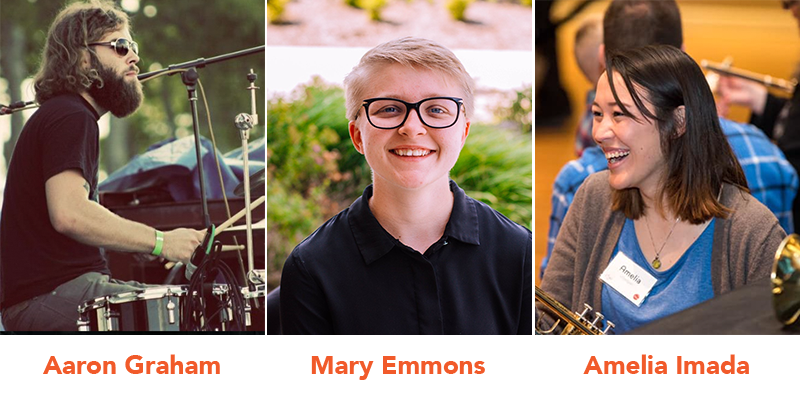
Mary Emmons (junior), Bachelor of Music Performance, University of Tennessee at Martin
In regards to my recital, we made some pretty big changes as COVID-19 started getting progressively worse in our state. One week after my hearing, Dr. Jones told me that UT Martin was becoming stricter with the shutdown and that there was a strong possibility that things could shut down completely before my recital date. With that came the question, “Don't freak out, but can you give your recital tomorrow or Saturday?” After a few phone calls to confirm availability, I gave my recital nine days early! If I hadn't given it early, who knows when I would've been able to do it, and I was, quite frankly, ready to move on. Now that I'm practicing at home, I've rearranged my room to have a practice space and have made a set block of time in the day that I can practice within. I don't get started too early so I don't wake anyone up, and I don't practice at night so I don't keep anyone awake (this also ensures that I have time for myself). As for my neighbor upstairs, I just let her know what was going on, and she assured me that she wouldn't be bothered. She loves listening to us practice and has even thought about getting out her old clarinet to start playing again. I've even taken a drum outside and given her grandson a mini concert from a safe distance.
Amelia Imada (senior), Music Education major, Xavier University
I have adapted to the situation by finding fun in a lot of hobbies I normally can't pursue due to lack of time. I love practicing piano and flute in my free time. I try to stay out of the news for most of the day, only checking for updates once a day. My roommate and I made the creative adjustment of scheduling "alone time" and "hangout time," knowing well that we could get annoyed with constant interaction.
Will Harris (freshman), Music Performance Major, Furman University
What has helped me cope has been figuring out all of the new opportunities that this strange time can offer. Personally, I have always wanted to get better at the manufacturing side of percussion, so I thought what better time than now to start some new projects. A few years back I, with some help, built a five-octave marimba, and a few weeks ago I built a mallet rack that's now hanging on my wall. Currently, I am starting the process of rewrapping and eventually making my own mallets.
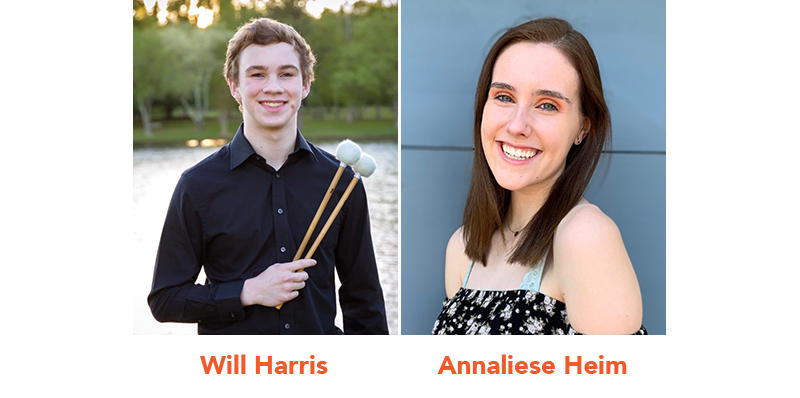
Annaliese Heim (freshman), Music Education major, University of Minnesota
Most of my adaptations have come in the way that I practice and the way that I present my material. Now that I am at home with two parents who are also musicians and practice their instruments, I can no longer practice for hours on end like I used to at school. I practice in 45-minute periods and hold myself to complete concentration during this time. I’m becoming more efficient and productive through this practicing schedule.
Lily Lee, Coppell High School
For my music audition coming up, I was planning to play a five-octave marimba solo, but because I am currently limited to a three-octave practice marimba, I had to change my direction. I kept wondering what I could play, given what I had, and one night I was listening to piano transcriptions on YouTube when “Watermelon Man” caught my attention. It was a fun, upbeat, jazzy piece, and I saw potential in it to be something more than a piano transcription. I’ve wanted to make a video with different instruments played by the same person, and I now had the time to give it a shot. For the right-hand portion of the transcription, I played it with my practice marimba, and for the left-hand portion, I used the marimba setting on my keyboard to replicate the bass. I played the snare rim-clicks by slapping against the strings of my guitar, and for the snare part, I used my drum pad. I recorded all of those parts and put it into one video that I will submit. It was definitely not what I expected going into the audition process, but I am glad to have taken this new challenge and for trying something new.
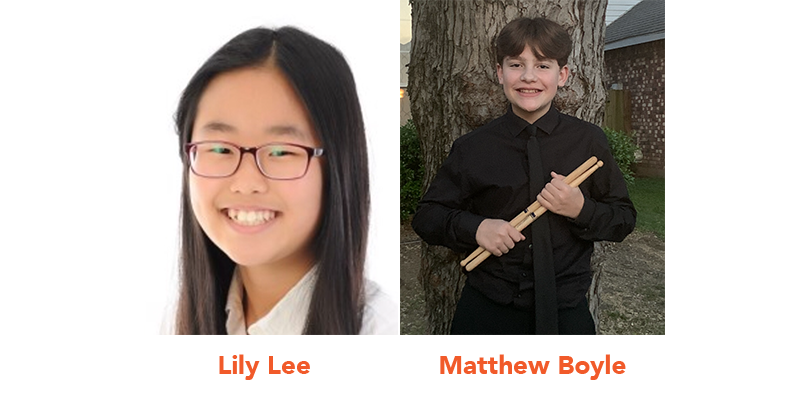
Matthew Boyle, Coppell Middle School East
Throughout the quarantine I have extended my practice schedule to replace lost class time, and I have focused on my mental and physical technique. I have given myself a goal for each day to get better at what I am practicing, whether it's to increase the tempo or fix my technique. I have also started a practice journal so I can track my progress throughout the time we are at home.
TEACHERS
Michael Burritt, Professor of Percussion, Eastman School of Music
Because there were so many challenges with the lack of instruments as well as issues with sound quality streaming, I have given my students unique projects like composing solos, writing etudes, and research-oriented assignments. Some have done really creative work during this time and opened areas of their output that will continue. In addition, we have done much more drum pad and accessory instrument work.
We continued our studio classes by having guests from the percussion community, and we’ve done both lecture/discussion and masterclass settings. Guests have included Sean Connors (Third Coast Percussion), Alejandro Viñao (composer), Jake Nissly (Principal, San Francisco Symphony), John Psathas (composer), Cynthia Yeh (Chicago Symphony), and J. B. LeClere (Paris Opera Orchestra). It's a great opportunity to give my students something special in addition to all of us connecting as a community.
Additionally, I put together a special seven-week Pedagogy and Literature class for my grad students and seniors. We meet once a week for a couple hours where they present assignments (on methods and repertoire) generating a robust discussion. It has been a definite positive for the students and myself.
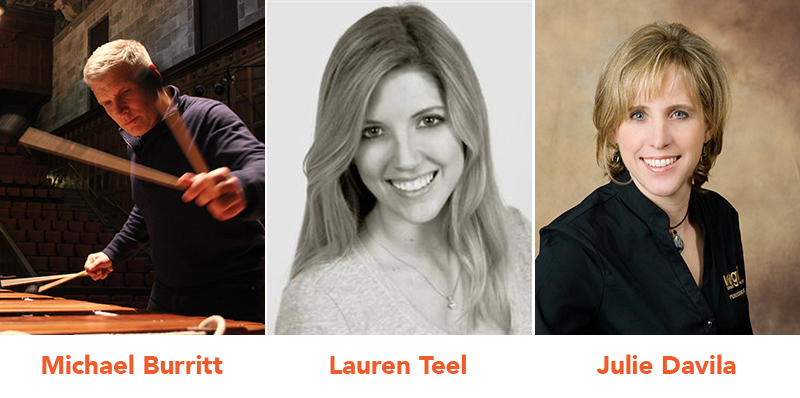
Lauren Teel, Percussion Caption Head, Troopers Drum and Bugle Corps
In terms of the Troopers front ensemble, we were fortunate that 10 out of 14 members had access to a keyboard. For those who did not, we recommended a few options that would offer technique and muscle memory work, one being the “marimba banner” created by Stephen L. Hughes. Having this or a homemade version allows members to participate in video assignments.
One new project from the Troopers is the “Vault,” part of which will showcase the talent in our ensembles. We have been collecting videos that members have created while in quarantine to be released throughout the summer. These videos include solos, etudes, or exercises students have been working on, as well as original compositions. It’s been exciting to see all the creativity in the ensemble. We are also working on putting together a few ensemble pieces (similar to Eric Whitacre’s “Virtual Choir”), using lot tunes and percussion ensemble pieces specifically arranged for the group.
Julie Davila, Middle Tennessee State University
From a professional-development standpoint, we dedicated several masterclasses to discuss developing websites, cover letters, and resumes, and gave students two weeks to create their own resumes. We shared a few finished products on a studio Zoom call and discussed recommendations or edits if needed. These masterclasses were coordinated so that the conclusion of the project aligned with real-time review from an industry professional. This project will definitely remain in our course rotation every few years. We also adopted the John Wooden book A Lifetime of Observationsto be read and shared in a type of “book club” format. We selected this book because it is an easy read, yet filled with incredible wisdom and life lessons.
Fernando Meza, Professor of Percussion, University of Minnesota
As far as adjustments, there have been many, starting with the fact that we are no longer sharing the same physical space. I have had to become familiar with online platforms that I didn't use before, and that has brought with it a small learning curve. On the creative side, we recently finished a video between us at the University of Minnesota, colleagues from the University of Costa Rica, the Costa Rica-UNED Percussion Ensemble, and Yilmer Vivas, a Venezuelan percussionist who plays for Cirque du Soleil. Originally, I had an idea that we would collaborate on an improvisatory session with utensils we could find in our kitchens. The idea grew into a much more elaborate project, and one of my students offered to write a piece for this new "Virtual Percussion Extravaganza" among all three institutions. The video has reached a lot of people and it has been shared many times, showing that interesting and creative percussion projects can indeed transcend borders and offer a glimpse of hope for everyone listening.
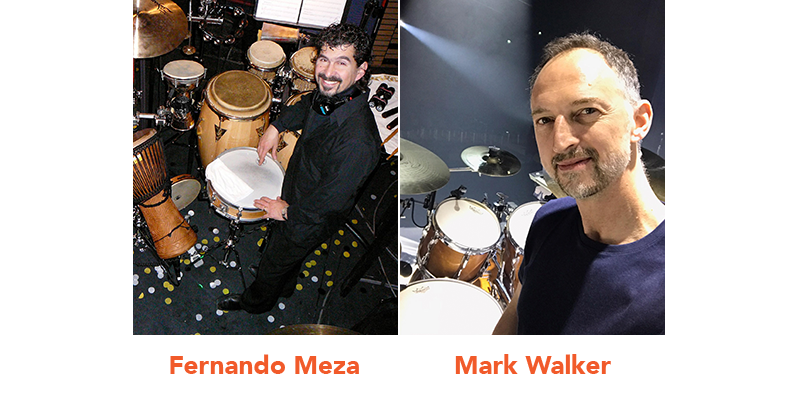
Mark Walker, Berklee College of Music, Freelance Artist
Fortunately, I have a home studio where I’ve filmed and recorded lessons and sessions for many years. I began a series of collaborations online with colleagues, recording and mixing tunes and drumming exercises, editing video, and uploading to social media, and this situation actually helped me streamline the process. It used to take me a week to go from start to finish for one video/audio/upload; now I can do three sessions a day.
At Berklee, the private lessons expanded, and I wound up thinking way beyond what was required. Instead of working only on time feels and rudiments, for example, I would assign tunes and transcriptions. It’s great to see these young players performing the solos I worked on when I was younger. I also assigned semester projects: a South African student will present a report on the music of South Africa, another student will cover the gospel tradition, and so on. Since most drummers have some kind of interface, they can record and film their performance. Some students didn’t have access to their instruments, so I assigned one such student to improvise a setup and post a weekly video about what he found.
In terms of ensembles, that was the hardest one to figure out. How do you get people to play together? I had to think of what I could do with both a beginning rhythm section ensemble and a high-level jazz ensemble. I tried having them play in class, but it was not very inspiring, so I assigned each of them to write a tune, on which everyone would overdub their parts. They get to write, arrange, record, upload, and promote themselves for future work, so there is a marketing aspect to it as well.
Dr. Sarah Waters, Performer and Educator, Ohio Northern University
We restructured lessons to what the students had available to them. Something harder to figure out was the senior recitals, which turned into digital projects. The projects included videos of what they could record at home, as well as a compilation video of past performances and offering self-critique. Therefore, I have a performance major graduating without this “all-important” senior recital video that he could use for further study. Hopefully, everyone will understand in about two years what happened to these kids in 2020.
As for the academic classes I teach, I had to scrap the syllabi and put lectures online. I settled on using PowerPoint slides with narration. I hate PowerPoint, but this seemed the best way to go with my classes (Non-Western Music and American Music). This also gave the students the option to watch and listen to the slides on their own time, as many of them who are now home are expected to help around the house and secure part-time jobs.
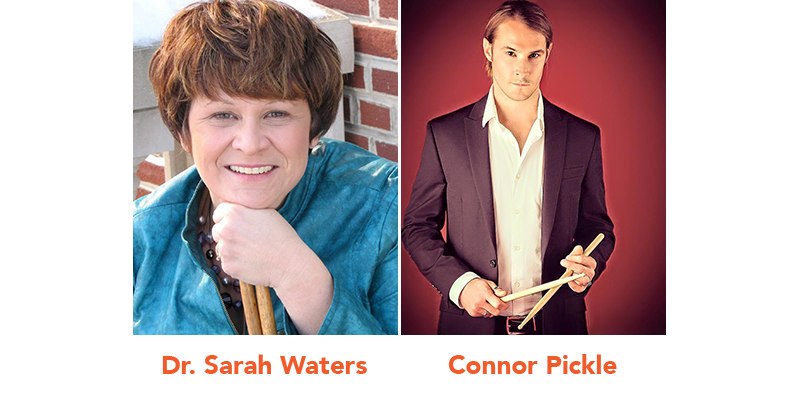
Connor Pickle, Percussion Director, Royse City ISD
So much of our teaching is predicated upon being able to observe and hear our students perform. Without directly monitoring students' learning, it is challenging to ensure that they are building the correct habits and skill sets. We had to make adjustments and accommodations for students at home due to the lack of resources that they normally have at school. Therefore, our assignments have been focused on specific skills that can be learned and performed with limited instrumentation. For percussion, we have focused on drum pad and keyboard playing, either with a bell kit, practice marimba, or on the floor doing mallet technique exercises. This has kept the students engaged and their hands moving.
We created instructional videos for students that detail every aspect of their weekly assignments, and students responded by creating a video of the material and submitting via Google Classroom. We use this tool to personalize each student’s learning and provide feedback to them directly. This has been very helpful! It has also provided an opportunity to combine student video submissions into virtual ensemble performances. This has been a fun exploration for students to continue learning music while at home. In the future, we plan to continue using Google Classroom as an additional strategy for engaging students throughout the year.
PERFORMERS
Sean Connors, Chicago, Illinois
Since a very large portion of what we do at Third Coast is performing touring concerts and residencies, we had to quickly find a way to shift these to be engaging online experiences. Our Studio Manager, Colin Campbell, helped to make our rehearsal space capable of multi-camera streaming. Everyone on the team shifted immediately to making Third Coast's online presence a priority, and we developed our "Digital TCP" self-produced content brand, which encompasses our interactive live streaming concerts, online masterclasses, and FAQ video series. All of this is now available on our YouTube channel.
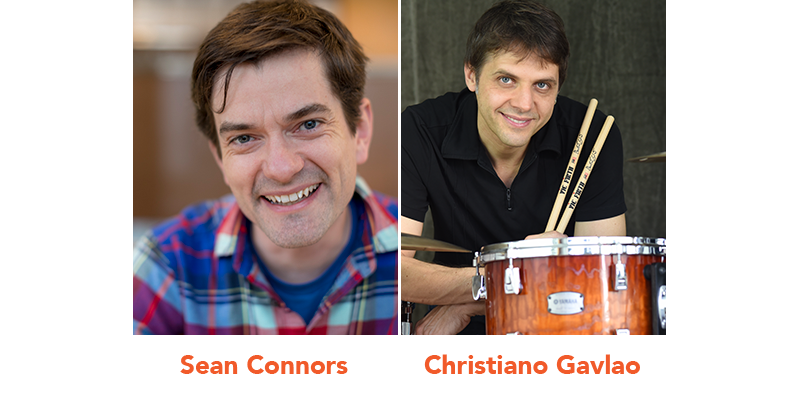
Christiano Gavlao, Rio de Janeiro, Brazil
Knowing that I won’t be playing live in the near future, I decided to “play along” with music by visiting websites/channels of my favorite musicians; I can practice or play along with their live-streaming events. Here in Brazil, a lot of musicians are sharing their experiences in live streaming, and I've been invited to do a couple of them. It is important to stay together with all the music and drum community even though we are in a virtual environment.
David Friedman, Berlin, Germany
I viewed the situation as a positive change and decided to use that newly found philosophy to change patterns in my own life. I never cooked for myself, always ate out, at least two times a day. So now what? Instead of moaning about it, I started cooking. I discovered an activity which had a rewarding end result; but, the process was even more astounding to me because it became a kind of meditation at a time where the world was suspended in a condition of constant stress.
Aside from cooking, I used the time to get more familiar with my recording equipment. I have a wonderful Zoom video camera with good audio, and I’ve now learned how to record video and audio at the same time. I have also started recording online collaborations with other colleagues. I realized that instead of mourning the change in our routines, I saw it as an opportunity for change. I have come to the realization that things would never be the same, which in many ways is a good thing.
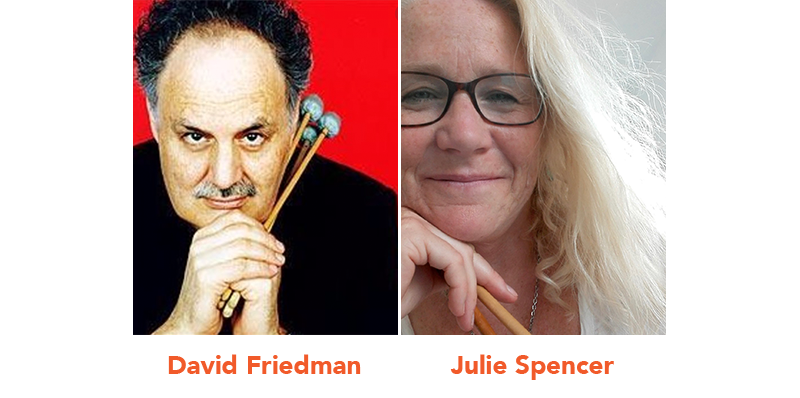
Julie Spencer, Bingen, Germany
After universities began to close and teaching shifted online (with early distancing regulations here in Germany, the curve of positive tests of the virus beginning to quickly flatten, and the health care system here relatively well-prepared), it became easier to build on a more optimistic foundation.
I placed a flyer on my Facebook account offering lesson packets for online marimba students. I also started composing again and envisioning new projects that wouldn't have been possible without all the extra time. The government provided support for freelance artists, and our finances were stabilized by the end of April for the next half-year.
I started a collaboration with my son, composing EDM music and learning about producing. I want to diversify my Spotify artist account with new music and develop ideas that have been coming together recently. It's something I've wanted to do for years, and now there's an opportunity. I'm practicing a lot of piano, improvising, and trying some new things with the malletKAT. It has become a creatively explosive time!
ADMINISTRATORS
Rich Holly, Executive Director for the Arts, NC State University
We made several purchases of video, audio, and lighting equipment as quickly as we could to get everyone set up at home. One heartwarming part was that a few formerly not-tech-savvy faculty members embraced the challenge, reached out to friends for recommendations, and then ordered equipment, got set up at home, and then shared with their colleagues what they purchased and how they’re using it.
All ensembles had to be taught online, and we have quite a variety of ways in which those are being handled. Conductors found ways to keep the students engaged and learning, including having Zoom sessions with nationally-recognized performers so the students could learn from professionals.
We're working through our challenges, and we've become therapists for our students, parents, alumni, patrons, and donors. It's common for our ticket office people to be on the phone for 20 minutes while the reason for the call was to refund a ticket, typically a two- or three-minute transaction. We've really had to employ a significant amount of empathy and be patient and caring well beyond what we normally do.
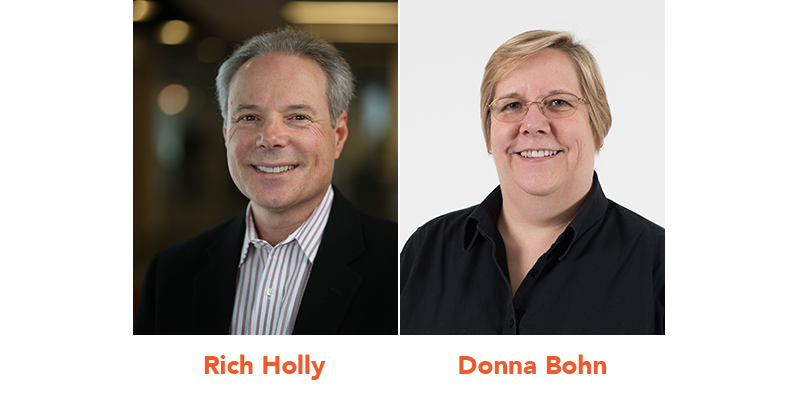
Donna Bohn, Chair of Arts and Humanities, MidAmerica Nazarene University
We had to get used to using Zoom for lessons and learn how to adjust the settings to hear the various instruments and voice well. Varying levels of internet access and technology was a problem, and assignments had to be adjusted for these issues, particularly in the music technology area and classes using Finale. We were able to continue using on-the-ground resources such as a theory workbook utilizing programs on the iPad, converting student pictures of completed homework into pdfs that were able to be graded using the Apple pencil. Screen and voice recording with staff paper on the iPad worked well for conveying theory concepts quickly and easily.
INDUSTRY
Andy Zildjian, Sabian, Inc.
We have been changing our marketing over the last year to be more inclusive with our customers, and with this sudden change we have accelerated that transition. The SEN (Sabian Education Network) has been doing more online community building and educating our friends in how to be online educators. We have at least one live event on social media per weekday starting on Mondays, with our Band and Educational manager Mark Reynolds talking with his friends in the Marching and Education areas. Tuesdays are “happy hour” chats between Chris Stankee, our Artist Relations leader, and two artists talking about drumming, touring, and things at home. On Wednesdays, Mark Love helps players who have questions about how to get the voice they’re looking for in a show called “Your Voice, the Right Choice.” He takes questions about cymbal sounds and walks around the vault giving advice, helping players pick the right cymbal for their needs. Thursdays we have our “Educator Spotlight,” hosted by the ever-popular Dom Famularo. He introduces the audience to educators who have distinguished themselves but may not yet be household names. Fridays, we round it out with Joe Bergamini hosting a SEN roundtable aimed at building the educator community and helping educators better themselves and their presentations, be it online or in person.
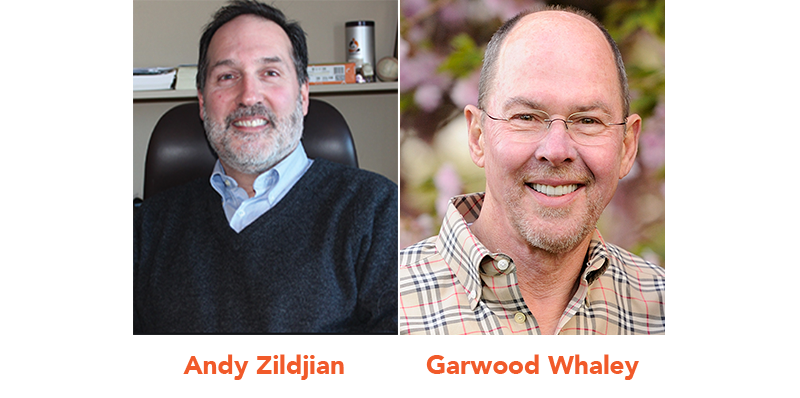
Garwood Whaley, Meredith Music Publications
Fortunately, many of our most popular titles are published as both hard copy and eBooks. Since most schools and universities held classes online, these materials were readily available. We did begin accelerating the transformation of hard copy into eBooks. We received many requests for digital content, which we are moving forward with.